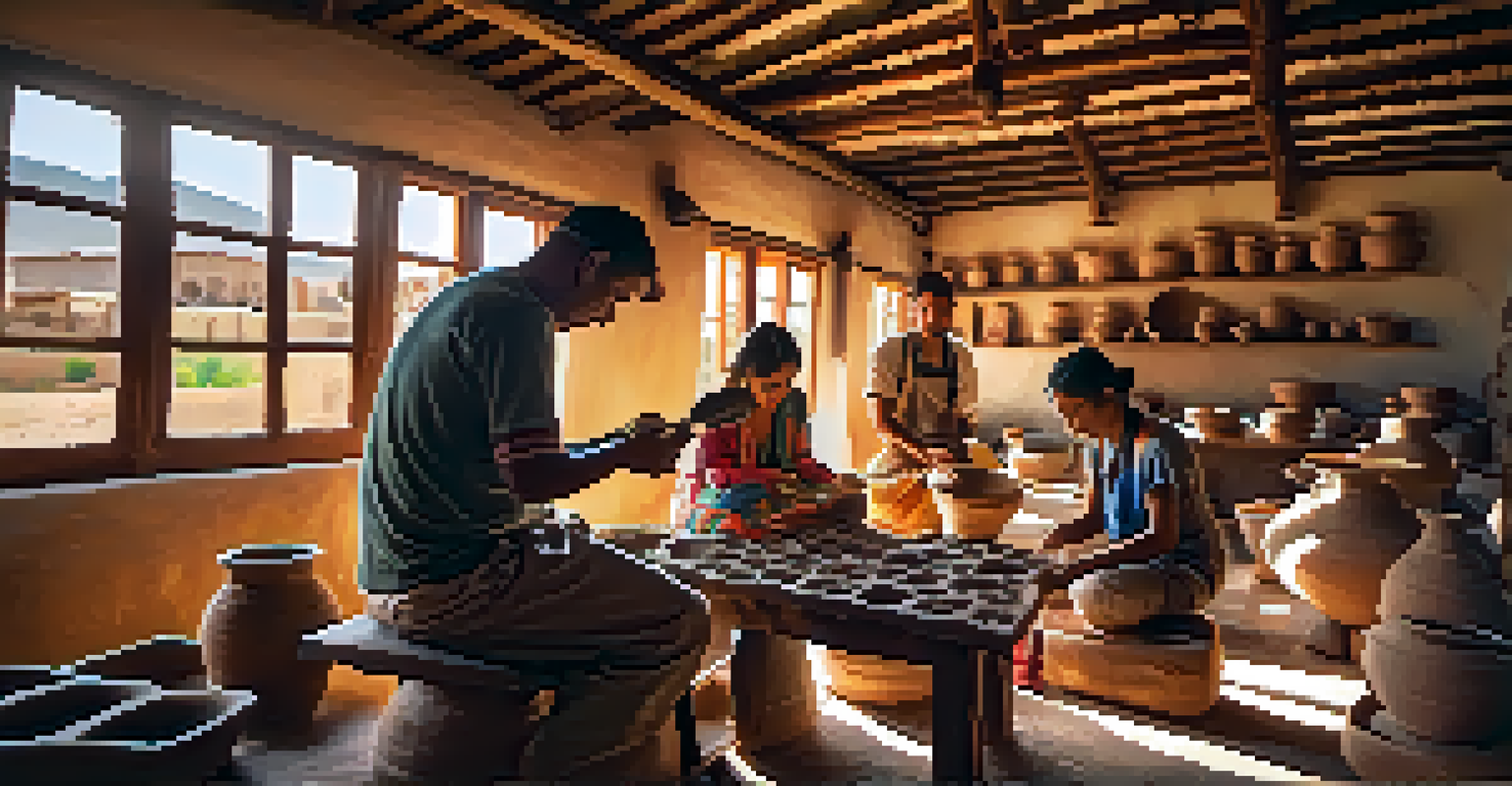Supporting Local Economies Through Responsible Travel

Understanding Responsible Travel and Its Importance
Responsible travel focuses on minimizing negative impacts while maximizing benefits for local communities. It encourages travelers to engage with destinations in a way that respects local cultures and environments. By choosing responsible travel, we can create a more sustainable tourism model that benefits everyone involved.
Traveling – it leaves you speechless, then turns you into a storyteller.
Think of responsible travel as a two-way street; it not only enhances your travel experience but also supports the local economy. When you participate in activities that are eco-friendly and culturally sensitive, you're contributing to a healthier environment and a thriving community. This approach allows travelers to make meaningful connections while ensuring their visit leaves a positive footprint.
Ultimately, responsible travel is about making choices that benefit destinations and their residents. By prioritizing local businesses, you not only enhance your own journey but also help preserve the unique characteristics that make each place special. This kind of travel isn't just about seeing new sights; it's about fostering a genuine connection with the world.
The Economic Impact of Responsible Travel
Responsible travel significantly boosts local economies by directing funds into small businesses, artisans, and local guides. When tourists choose to dine at local restaurants or shop at neighborhood markets, they help create jobs and stimulate economic growth. This approach contrasts sharply with spending at large, international chains that often repatriate profits back to their home countries.

For example, a traveler who opts for a locally-owned bed-and-breakfast instead of a multinational hotel chain is directly contributing to the livelihood of a family. This not only helps sustain the local economy but also creates a more authentic travel experience. The personal stories and insights shared by local hosts can enrich your understanding of the area far beyond what any guidebook can offer.
Boosting Local Economies
Responsible travel directs funds to local businesses, enhancing community livelihoods and supporting economic growth.
Furthermore, investing in local economies encourages communities to preserve their cultural heritage and natural environments. When locals see tangible benefits from tourism, they are more likely to engage in conservation efforts, ensuring that their unique way of life and the beautiful landscapes remain intact for future generations.
Choosing Local Accommodations and Services
Selecting local accommodations and services is a key component of responsible travel. Staying at locally-owned hotels or guesthouses often provides a more personalized experience, allowing you to connect with the community in meaningful ways. These establishments frequently reflect the character of the area, showcasing unique architecture, local cuisine, and hospitality.
The journey not the arrival matters.
For instance, imagine waking up in a cozy inn run by a local family who knows the best spots to visit. They might share hidden gems that aren’t in typical travel guides, offering you an authentic taste of the culture. This kind of interaction not only enriches your trip but also ensures that your money stays within the community.
Additionally, many local accommodations prioritize sustainable practices, such as using eco-friendly products and supporting local farmers for their food. This commitment to sustainability aligns with the principles of responsible travel, ensuring that your stay has a positive impact on both the environment and the local economy.
Engaging in Local Experiences and Activities
Participating in local experiences, such as cooking classes, craft workshops, or guided tours, is a fantastic way to support local economies. These activities often involve local artisans and experts who share their skills and knowledge, providing travelers with authentic insights into the culture. By engaging in these experiences, you contribute directly to the livelihoods of local people.
Consider a scenario where you learn to cook traditional dishes from a local chef. Not only do you gain a new skill, but you also help sustain the culinary traditions of that community. Such interactions foster deeper appreciation and understanding of the local culture, making your travel experience more enriching.
Engaging with Local Cultures
Participating in local experiences fosters genuine connections and helps preserve cultural heritage.
Moreover, these local experiences often prioritize sustainability and ethical practices, ensuring that the benefits are shared equitably. Travelers can feel good knowing that their participation supports community development and promotes responsible tourism practices.
The Role of Sustainable Transportation in Travel
Sustainable transportation options, like biking, walking, or using public transport, play a crucial role in responsible travel. By choosing these modes of transport, travelers can reduce their carbon footprint while also supporting local economies. For example, local bus services or bike rentals often provide jobs and stimulate the economy.
When you opt for a bicycle tour instead of a car rental, you not only get to see the sights at a slower pace but also inject money into local businesses that depend on tourism. This creates a win-win situation, where travelers enjoy a unique experience while helping to preserve the local environment and economy.
Additionally, sustainable transportation encourages the exploration of less-touristed areas, providing a more authentic experience. By venturing off the beaten path, travelers can discover hidden local treasures, further enriching their journey and supporting communities that rely on tourism.
Advocating for Local Culture and Heritage
Promoting and respecting local culture and heritage is essential in responsible travel. This involves understanding and appreciating the customs, traditions, and values of the communities you visit. When travelers show respect for local culture, they foster goodwill and build positive relationships with residents.
For instance, participating in local festivals or ceremonies can offer travelers a unique perspective on a community's heritage while providing financial support to those organizing the events. By engaging with local traditions, you help sustain them, ensuring they remain vibrant and relevant.
Sustainable Travel Choices
Choosing eco-friendly transportation and accommodations reduces environmental impact while benefiting local communities.
Moreover, advocating for local culture encourages the preservation of historical sites and practices. When communities see that their heritage attracts visitors, they are more likely to invest in conservation efforts, ensuring that future generations can enjoy these cultural riches.
Challenges and Solutions for Responsible Travel
While responsible travel offers many benefits, it also presents challenges that need addressing. Over-tourism can strain local resources, leading to environmental degradation and cultural dilution. Thus, it’s essential for travelers to be mindful of the impact their visit may have and seek to minimize it.
One way to tackle these challenges is by spreading awareness about sustainable practices among travelers and encouraging them to make informed choices. This means opting for off-peak travel times, staying longer in fewer locations, and supporting initiatives that promote responsible tourism.

Additionally, collaboration between travelers, local communities, and governments can foster a more sustainable tourism model. By working together, we can find solutions that balance the needs of visitors with those of the local population, ensuring that tourism continues to thrive while preserving the integrity of local cultures and environments.